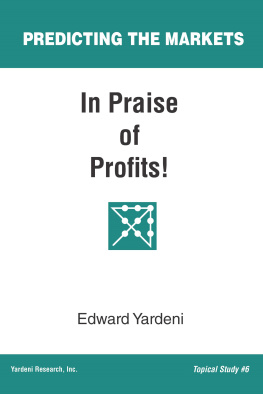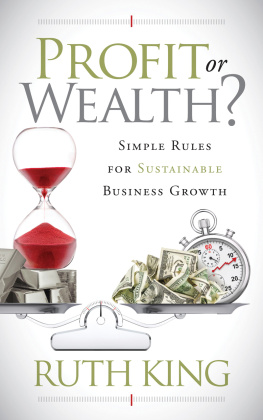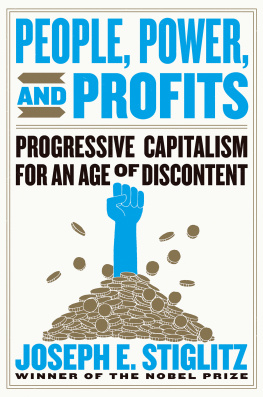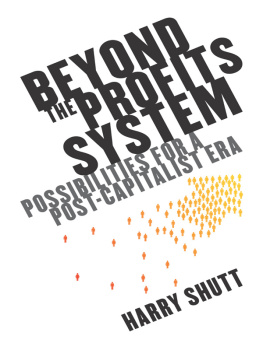

In Praise of
Profits!
Edward Yardeni

YRI PRESS
Predicting the Markets Topical Study #6:
In Praise of Profits!
Copyright 2021 Edward Yardeni
All rights reserved. No part of this publication may be reproduced in any form or by any electronic or mechanical means, including information storage and retrieval systems, without permission in writing from the publisher, except by reviewers, who may quote brief passages in a review.
978-1-948025-12-6 (print)
978-1-948025-13-3 (eBook)
Library of Congress Control Number: 2021917941
The author has taken all reasonable steps to provide accurate information in this publication. However, no representation or warranty is made as to the fairness, accuracy, completeness, or correctness of the information and opinions contained herein. Over time, the statements made in this publication may no longer be accurate, true, or otherwise correct. Over time, the authors opinions as articulated in this publication may change. This publication should not be relied on for investment, accounting, legal, or other professional advice. If readers desire such advice, they should consult with a qualified professional. Nothing in this publication including predictions, forecasts, and estimates for any and all markets should be construed as recommendations to buy, sell, or hold any security, including mutual funds, futures contracts, exchange-traded funds, or any other financial instruments.
Published by YRI Books, a division of Yardeni Research, Inc.
68 Wheatley Road, Suite 1100
Brookville, NY USA 11545
Contact us:
Excerpted, updated, and expanded from Predicting the Markets: A Professional Autobiography (2018).
To my children:
Laura, David, Samuel, Sarah, and Melissa
Serve your customers well.
Profits will follow.
Authors Note
This study is another in a series of Topical Studies
examining issues that I discussed in my book
Predicting the Markets: A Professional Autobiography
(2018), but in greater detail and on a more current basis.
Previous studies in this series, which are available on
my Amazon Author Page, include:
The Fed and the Great Virus Crisis (2021)
S&P 500 Earnings, Valuation, and the Pandemic (2020)
Fed Watching for Fun and Profit (2020)
Stock Buybacks: The True Story (2019)
The Yield Curve: What Is It Really Predicting? (2019)
The charts at the end of this study were current as of
August 2021. They are available in color
along with linked endnotes at www.yardenibook.com/studies.
Institutional investors are invited to sign up for the
Yardeni Research service on a complimentary trial basis at
yardeni.com/trial.
Contents
About the Author
Dr. Ed Yardeni is the President of Yardeni Research, Inc., a provider of global investment strategy and asset allocation analyses and recommendations. He previously served as Chief Investment Strategist of Oak Associates, Prudential Equity Group, and Deutsche Banks US equities division in New York City. He was also the Chief Economist of CJ Lawrence, Prudential-Bache Securities, and EF Hutton. He taught at Columbia Universitys Graduate School of Business and was an economist with the Federal Reserve Bank of New York. He also held positions at the Federal Reserve Board of Governors and the US Treasury Department in Washington, D.C.
Dr. Ed earned his PhD in economics from Yale University in 1976, having completed his doctoral dissertation under Nobel Laureate James Tobin. Previously, he received a masters degree in international relations from Yale. He completed his undergraduate studies, magna cum laude, at Cornell University.
Dr. Ed is frequently quoted in the financial press, including The Wall Street Journal, the Financial Times, The New York Times, and Barrons. He was dubbed Wall Street Seer in a Barrons cover story. He appears frequently on CNBC, Fox Business, and Bloomberg Television.
Nothing contributes so much
to the prosperity and happiness
of a country as high profits.
David Ricardo
It is a socialist idea that making
profits is a vice. I consider the
real vice is making losses.
Winston Churchill
Introduction
Time to Clear Up the Confusion
There has been much confusion about corporate profits. Thats because there are several measures of profits and very little understanding of, or even interest in, how they differ. As a result, there has been lots of sloppy analysis and misinformed discussion of such important issues as the central role of profits in economic growth, the trend of profits, the corporate tax rate, the profit margin, profits share of national income, and corporate share buybacks.
The confusion has played into the hands of progressives. They claim that free-market capitalism, driven by the profit motive, causes wage stagnation and results in both income and wealth inequality. They want the government to redistribute income and wealth by increasing taxes on the rich and on corporations. They refuse to acknowledge that profit-driven capitalism is the source of our nations widespread prosperity. They say that the relevant data support their claims; thats not so, as I demonstrate in this book. I conclude that the entrepreneurial variety of capitalism should be allowed to flourish. If it does so, so will we all.
More recently, some of these progressive critics have suggested ways to save capitalism from itself by forcing company managements to stop focusing on maximizing profits for the benefit of their shareholders. Instead, the would-be saviors of capitalism promote the idea that companies should focus on satisfying the diverse needs of their stakeholders. This broad group includes customers, employees, vendors, communities, minorities, environmentalists, the press, and the public at large.
Progressive politicians and their economic advisers often claim that the data show that profits have gained share of national income at the expense of workers, thus causing income stagnation and exacerbating income and wealth inequality. Furthermore, they claim that corporate share buybacks represent an egregious misallocation of capital by greedy corporate executives aiming to boost their companies earnings per share and share prices for the benefit of shareholders and to enrich themselves by driving up the value of their stock grants and options. The money would be better spent paying workers more and investing more in their companies for the benefit of their diverse stakeholders, say the progressive politicians. Yet, though they hold strong opinions on how companies ought to be managed and regulated, most have never actually run a business.
As I will show in this study, the progressives narrative about the relationship between profits and prosperity is wrong and misleadingly pessimistic. In short, its backward: Market-driven profit is the source of prosperity, not its nemesis. Ironically, profit is what drives the progress in standards of living that progressives, with their policy approaches, claim to champion. But progressives seem blind to the progress that has been achieved and perpetually want to do more. In my opinion, progress has been made despite their persistent policy interventions thanks to the power of the profit motive to deliver profits and widespread prosperity in a free-market economic system.
Next page












